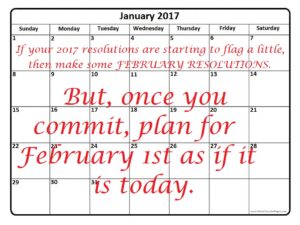Why We Expect So Much from Ourselves “Next Year”
When we think about our goals in a “new” time period, we neglect the constraints.
Written by:
Benjamin A. Converse, Assistant Professor of Public Policy and Psychology, Frank Batten School of Leadership and Public Policy and Department of Psychology; Director, Social Behavior and Decisions Lab
Ilana Brody, fourth-year Psychology and Economics major, working on a Distinguished Majors project in the Social Behavior and Decisions Lab

Not so long ago, this year was still “next year.” And back when it was, were your expectations high? Next year, I’ll start eating healthier. Next year, I’ll exercise more. Next year, I’ll be one of those people who tidies up a little each day. Why are so many of us so seduced by “next year”?
Research from our team in the Social Behavior and Decisions Lab suggests that the idea of “next year” actually changes how people think about their goals. When people perceive temporal boundaries–cues that mark the beginning of a new week, month, or other time period—they think differently about initiation opportunities on the other side. It’s not just fuzzy optimism. Different thoughts actually come to mind. And those thoughts guide expectations and commitments that can have consequences for goal-pursuit success.
In one of our experiments, forthcoming in the journal Social Psychological and Personality Science, we asked prospective dieters to write down the thoughts that came to mind when they considered starting to eat healthier on the following day. We coded their responses to determine the relative balance of thoughts about the (mostly pleasant) outcomes of eating healthier – like losing weight and having more energy – versus the (mostly challenging) reality of pulling it off – like going to the grocery store or figuring out what to cook.
We ran the study on July 31st. For half of the participants, we did not mention calendar dates, just days of the week. These respondents were relatively more focused on the constraints of eating healthy than on the desirable outcomes. For the other half of participants, we did mention the calendar dates. In this group, who presumably recognized the upcoming new month, the balance of thoughts was different. Respondents were relatively more focused on the desirable outcomes of healthy eating than on the pesky constraints. They were still thinking about healthy-eating just one day in the future, but for them it seemed like a new month. It was as if the idea of turning a calendar page blocked the constraints from coming to mind.
Expectations and plans can rise and fall along with changing thoughts. In another study, run on a Wednesday at the end of February, we asked a new group of prospective dieters about their expectations. Those who we led to think about calendar dates had low expectations for themselves on February 27th and 28th, but much higher expectations starting on March 1st. Another group of people, thinking about the exact same time period, but in terms of weekdays, had low expectations for the first four days, but higher expectations starting on Monday.
Our lab is continuing to study this phenomenon, trying to better understand how to help people initiate and persevere in their long-term goals. In the meantime, our work so far highlights two potential traps that any motivated person should try to avoid. First, it is important to recognize that, from the perspective of temporal boundaries, time is a merry-go-round. There is always a new chance – a new week, month, or year – to leave bad habits behind and start a new pursuit. But, there is also always a new chance to put off that pursuit until the next new chance. Second, today always becomes tomorrow and the same constraints will apply. It can be useful to leverage the high expectations of a new period, but it is critical to plan for the inevitable constraints that will arise.
If your 2017 resolutions are starting to flag a little, then make some February resolutions. But, once you commit, plan for February 1st as if it is today.
- Guastavino Tile at the University of Virginia
- Abraham Lincoln on Character, Leadership and Education
- Silence is Golden: Celebrating the History of Silent Films
- UVA Northern Virginia Programs Fair
- UVA Club of Los Angeles: Influential Communication
- UVA Club of Washington DC: UVA vs Wake Forest Men's Basketball Game Watch

